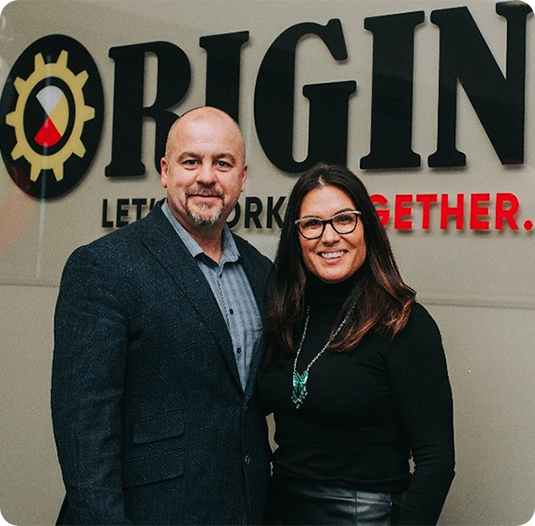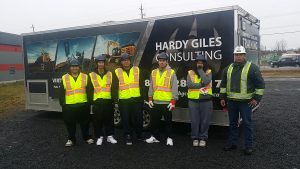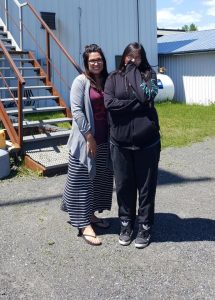Announcements
For press opportunities, please email info@immersivelink.ca.

Indigenous History Month
Today marks the start of Indigenous History Month in Canada. June was declared National Indigenous History Month in 2009. This month is a time to reflect on the deep-rooted history of Indigenous peoples in Canada. Learning more about this history and Indigenous culture is so important when it comes to working towards reconciliation.
The Significance of Indigenous History Month
This month has significance for me as it shows positive change when it comes to recognizing and celebrating Indigenous culture. It offers the opportunity for important conversation and education around the history of Indigenous people that isn’t taught in the classroom or the workplace. Seeing different events take place where people can either celebrate or learn more about specific topics makes me hopeful that more and more people are taking individual action towards reconciliation. When in these spaces where an Indigenous person may be speaking about our culture and experiences, it’s important to remain respectful and understand that with this dark history can come with a lot of emotions. When you are entering these conversations, make sure you are coming to the table with an openness to learn and willingness to pass these messages forward and uplift those around you.
“Seeing different events take place where people can either celebrate or learn more about specific topics makes me hopeful that more and more people are taking individual action towards reconciliation.”
Progress towards reconciliation
The increase in discussions we see around reconciliation is still somewhat new. While there may be a lot more messages on social media and more topics covered in the news, there is still a lot of progress to be made towards meaningful action. In 2009, before I started ORIGIN, reconciliation wasn’t something that was talked about so openly. At the time when I was considering co-founding ORIGIN, I met someone who completely changed my perspective and really motivated me to use my skills to support our communities.

Some of our first trainees certified as Heavy Equipment Operators back in 2016.
The importance and impact of opportunity
Ashley was one of the first candidates to participate in our Heavy Equipment screening. She was quiet and reserved and wasn’t sure what she wanted to do in terms of her career. When Ashley first came to Thunder Bay to complete the screening and training, there was a rise in violence against Indigenous people in the area. I spent time taking Ashley back and forth between her hotel and made sure her mom knew she was safe. While Ashley was taking a risk by attending for multiple reasons, she completed the training with flying colours and continues to have a successful career as an equipment operator today.

Myself and Ashley, Kasabonika’s first ever first female operator, after she just landed a major position!
I wanted to share this story for two reasons. One, to show how providing these opportunities cannot only change one person’s life but can also pave the way for them to become role models for their family and other community members. Two, is to exemplify that while there is change happening in certain aspects, racism, violence and inequality are still prevalent today. Ashley reinforced my passion for finding ways to support reconciliation and to this day that story still sticks with me.
“Ashley reinforced my passion for finding ways to support reconciliation and to this day that story still sticks with me.”
Storytelling plays a very important role in Indigenous culture. It is how we pass down history and traditions! Knowledge Keepers and storytellers share their knowledge with younger generations as a form of cultural preservation. Indigenous history is not documented in the same way that we see the history of other groups preserved. For those who hold this knowledge, it is important that they can pass it down to preserve our history.
Indigenous Cultural Preservation
With our integration of technology, I knew we had to find a way to incorporate some form of cultural preservation. This is what we see today as our ImmersiveLink Cultural library. We have the honour of working with storytellers and Knowledge Keepers to preserve these traditions in 360 video experiences. These experiences capture the stories and traditions of Indigenous culture from Medicine Walks to Full Moon Ceremonies to trapping and hunting. Indigenous people can use these experiences as a way to connect or reconnect with Indigenous culture. It also serves as an educational tool that can be used by non-Indigenous people in the classroom, workplace, or personally.
We are continuing to expand ways in which we can support communities like our ImmersiveLink Pow Wows. Communities can have their Pow Wows captured in 360 video to serve as a time capsule of these community celebrations that can be viewed at a later date. There are exciting updates to the ImmersiveLink offering that are in the works – so IL subscribers, keep an eye out for these updates!
Throughout the month, ORIGIN will be sharing a variety of educational snippets from general cultural facts, snippets from our IL cultural experiences, messages from Knowledge Keepers, and resources for you to learn more. So, stay tuned for your daily facts and updates across all ORIGIN pages!
- Instagram: @originimmersivelink
- Facebook: @ORIGINletsworktogether
- LinkedIn: ORIGIN
This month, I’m sure you’ll see a rise in events and discussion around Indigenous culture. While I love taking this time to celebrate and reflect, it is important to remember that reconciliation should be an ongoing discussion year-round. It takes everyone coming together to move towards the same cause to achieve great change.
Let’s work. Together.
